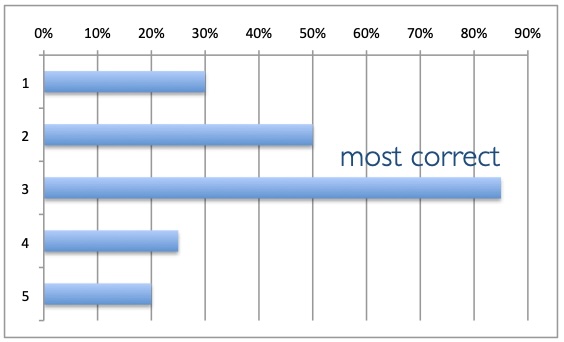Clinical decision-making is predominantly scenario based, weighing up uncertainties and selecting the best option (rather than a ‘correct’ or ‘incorrect’ answer) for an individual in their individual circumstances. Knowledge in clinical disciplines around the world typically assesses candidates’ choices of a single best answer (SBA) to clinical scenarios, thus requiring the application of knowledge rather than simple knowledge recall.
A single best answer examination can quickly sample from the whole curriculum and have results available immediately after the test. Almost all the work of a (‘best of five’) SBA paper is in its preparation, with little post-test work, unlike essay marking. Their main disadvantages are their reward of recognition and their unrealism in having five pre-determined options.
Construction of an SBA question requires it:
- To have a consistent and agreed style (avoiding construct irrelevance).
- To pass the ‘cover test’, i.e. be answerable without first seeing the answer options.
- To avoid rewarding ‘test wise’ candidates (especially through limiting ‘convergence strategy’ opportunities).
Clinical SBAs are blueprinted to topics that are common (frequently presenting) and important (life threatening or life changing). It is challenging to write SBAs on certain topics, especially those either with clearly correct or incorrect answers (e.g. clinical science) or those requiring lengthy discursive explanation (e.g. social science, ethics and professionalism).
Future directions for SBA question construction include:
- Three answer options instead of five (easier to write yet nearly as reliable).
- ‘Open book’ assessments (particularly challenging with availability of large language model artificial intelligence).
- Very-short-answer questions: substituting the five options with candidate-generated limited free text that is marked by computer, giving a more realistic but challenging test.
Future directions for SBA exam test delivery include:
- From paper to computer. UK undergraduate medical exam delivery is already being shaped by the requirements of the UK’s new Medical Licensing Assessment, a 200-item SBA assessment based on clinical scenarios. Thus, increasingly medical students sit SBA knowledge tests on computers (with questions presented in random order) in invigilated venues.
- Computer adaptive testing, with items presented of varying difficulty according to previous answers.

